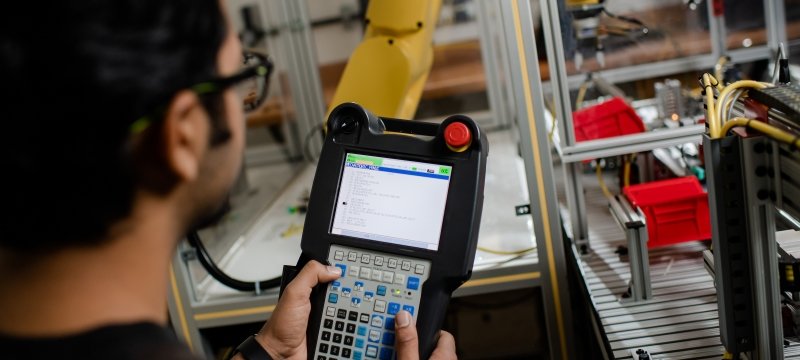Seek Emerging Pathways
This degree allows students to determine a flexible mix of coursework in electrical and computer engineering, engineering from related fields, physical sciences, and computer science to meet their educational and career goals. Pursue graduate study in electrical energy systems, robotics, signal and image processing, communications, embedded systems, electro-magnetics, optics, and photonics. Learn the connections between hardware, software, and the physical world. Explore the convergence of electrical engineering and computer engineering.
A Flexible Program
- There are no required courses.
- Applicants with undergraduate backgrounds in electrical engineering, computer science, physics, mechanical engineering, and other diverse areas are welcome.
- Students benefit from an interdisciplinary yet rigorous program.
- The Master of Science in Electrical and Computer Engineering (MS EECE) program is offered both on campus and online.
The curriculum structure of the MS EECE program has three options: Coursework, Report, and Thesis. All require 30 credits of graduate work beyond the BS degree.
Accelerated Master's of Electrical and Computer Engineering
The Electrical and Computer Engineering Accelerated Master’s programs allow a student who earned their bachelors at Michigan Tech to count up to nine senior-level credits* (must have earned a B or higher) toward both a Bachelor of Science in Electrical or Computer Engineering and a Master of Science in Electrical and Computer Engineering. If Michigan Tech students have earned senior rule credits, they will apply to the graduate degree.
An Electrical and Computer Engineering Accelerated Master’s student is typically admitted on the coursework option path. A thesis option and a report option are available for students who want to gain a competitive edge in industry with an accelerated advanced degree. There is a growing demand for graduates with a Master’s degree in electrical and computer engineering, and the accelerated program will provide you with a pathway to meet this need in fewer semesters.
*Note: Beginning fall 2024, up to nine double-counted credits may be applied. Prior to fall 2024, six double-counted credits may be applied
Advising
- Each student who begins graduate study will work with a faculty advisor who is a member of the Electrical and Computer Engineering faculty. The advisor’s primary responsibility is to supervise the student’s research, academic and professional growth, and development of an academic plan for enrolling in the appropriate courses.
- The academic plan developed by the student and academic advisor will need written approval from the faculty advisor and the Departmental Graduate Program Director
Tailored to Meet Your Goals
There are no required courses in this program. However, the Graduate Program Director and the departmental faculty will help the students tailor programs to fit their interests and needs..
The credit requirements for the three options are summarized in the table below.
| Coursework | Report | Thesis | |
|---|---|---|---|
| 5000 level EE, CS, BE, MA, ME, or PH | 18 minimum | 12 minimum | 12 minimum |
| 4000 level courses | 12 maximum | 12 maximum | 9 maximum |
| Co-op credits (included in above) | 3 maximum | 3 maximum | 3 maximum |
| Research credits | 0 | 2-6 | 6-10 |
MS and Accelerated Master's Detailed Options
Choose an Online Focus
The coursework option also features an online focus area.
